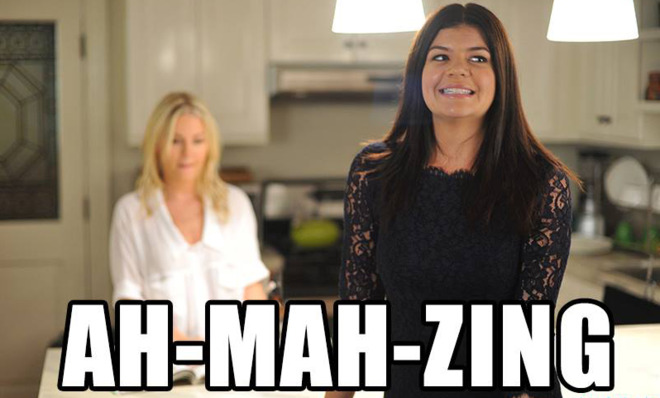9 fascinating facts about the schwa
You probably don't realize it, but schwa is the most common vowel sound in English


A free daily email with the biggest news stories of the day – and the best features from TheWeek.com
You are now subscribed
Your newsletter sign-up was successful
We all know that English spelling is rarely a good guide to pronunciation. One big reason for this is the prevalence of schwa in the spoken language. That's why dictionaries and other written guides to pronunciation make use of a special symbol to represent the schwa sound. It looks like this: ǝ — an upside down e. But what is schwa anyway? Here are nine things to help you get to know this very important vowel.
1. ANY WRITTEN VOWEL CAN BE A SPOKEN SCHWA
A schwa is the 'uh' sound found in an unstressed syllable. For example, the first syllable in amazing (ǝ-MA-zing), the first syllable in tenacious (tǝ-NA-cious), the second syllable in replicate (RE-plǝ-cate), the second syllable in percolate (PER-cǝ-late), the first syllable in supply (sǝ –PLY), the first syllable in syringe (sǝ-RINGE). That's a written A, E, I, O, U and even a Y coming out as schwa in the spoken version.
The Week
Escape your echo chamber. Get the facts behind the news, plus analysis from multiple perspectives.

Sign up for The Week's Free Newsletters
From our morning news briefing to a weekly Good News Newsletter, get the best of The Week delivered directly to your inbox.
From our morning news briefing to a weekly Good News Newsletter, get the best of The Week delivered directly to your inbox.
2. IT'S THE MOST COMMON VOWEL SOUND IN ENGLISH
And this can make things very hard for English learners, because we don't represent it in regular writing. You have to use clues about stress and syllable structure to figure out where to put it.
3. THE WORD "SCHWA" COMES FROM HEBREW
In Hebrew writing, "shva" is a vowel diacritic that can be written under letters to indicate an 'eh' sound (which is not the same as our schwa). The term was first used in linguistics by 19th century Germany philologists, which is why we use the German spelling, "schwa."
A free daily email with the biggest news stories of the day – and the best features from TheWeek.com
4. THE Ǝ SYMBOL WAS INVENTED TO SHOW HOW PEOPLE REALLY TALKED
The upside down e was first used as a symbol for the schwa sound by Johann Schmeller in his 1821 grammar of Bavarian German. Because he was describing the specific properties of a particular dialect, he needed a way to represent actual pronunciation.
5. BEFORE PEOPLE STARTED CALLING IT "SCHWA" IN ENGLISH (AROUND 1895) IT HAD A LOT OF NICKNAMES
It's been called the murmur vowel, the indeterminate vowel, the neutral vowel, the obscure vowel, and the natural vowel.
6. ENGLISH HAS A TENDENCY TO DELETE A SYLLABLE WITH A SCHWA
What happened to the third syllable in the following words? Caramel (car-mel), separate (sep-rate), different (dif-rent), chocolate (choc-late), camera (cam-ra). They fell victim to a terrible disease called schwa syncope (or schwa deletion). Actually, it's not so terrible, and it happens in lots of languages. A schwa syllable following the syllable that bears the main stress says, "well I'm not really needed here anyway" and skips town.
7. BUT ENGLISH SOMETIMES HAS A TENDENCY TO STICK IN EXTRA SCHWA SYLLABLES
In some dialects a schwa shows up to help bust up difficult consonant clusters. This process, called schwa epenthesis, can turn realtor into real-ǝ-tor, athlete into ath-ǝ-lete, nuclear into nuc-yǝ-ler, and film into fi-lǝm. It can also come in handy in drawing out words for dramatic effect, as in "cǝ-raaaaaa-zy!"
8. SCHWA IS SO PREVALENT BECAUSE ENGLISH IS A STRESS-TIMED LANGUAGE
Some languages are syllable-timed, like Spanish, where each syllable is roughly the same length, giving the impression of a steady "machine-gun" rhythm. English is a stress-timed language, meaning that the rhythmic impression is based on the regular timing of stress peaks, not syllables. If you want to speed up in Spanish, you shorten the length of all the syllables. If you want to speed up in English, you close the distance between stressed syllables. How? By greatly reducing the unstressed syllables. What vowel do unstressed syllables tend to get? Schwa. Here's a good explanation of stress-timing with examples.
9. IT'S THE LAZIEST SOUND THERE IS
Which is not a value judgment! I love schwa! But of all the sounds we use, it demands the least of us. All you have to do to make a schwa is start up the vocal cords. Other sounds require you to raise or lower the tongue, or move it forward or backward. They ask you to move your lips, or open your jaw. The schwa just is. Serene and undemanding. The vibration of air through the body to the outside world. The essence of speech itself.
Arika Okrent is editor-at-large at TheWeek.com and a frequent contributor to Mental Floss. She is the author of In the Land of Invented Languages, a history of the attempt to build a better language. She holds a doctorate in linguistics and a first-level certification in Klingon. Follow her on Twitter.
-
 What is the endgame in the DHS shutdown?
What is the endgame in the DHS shutdown?Today’s Big Question Democrats want to rein in ICE’s immigration crackdown
-
 ‘Poor time management isn’t just an inconvenience’
‘Poor time management isn’t just an inconvenience’Instant Opinion Opinion, comment and editorials of the day
-
 Bad Bunny’s Super Bowl: A win for unity
Bad Bunny’s Super Bowl: A win for unityFeature The global superstar's halftime show was a celebration for everyone to enjoy
